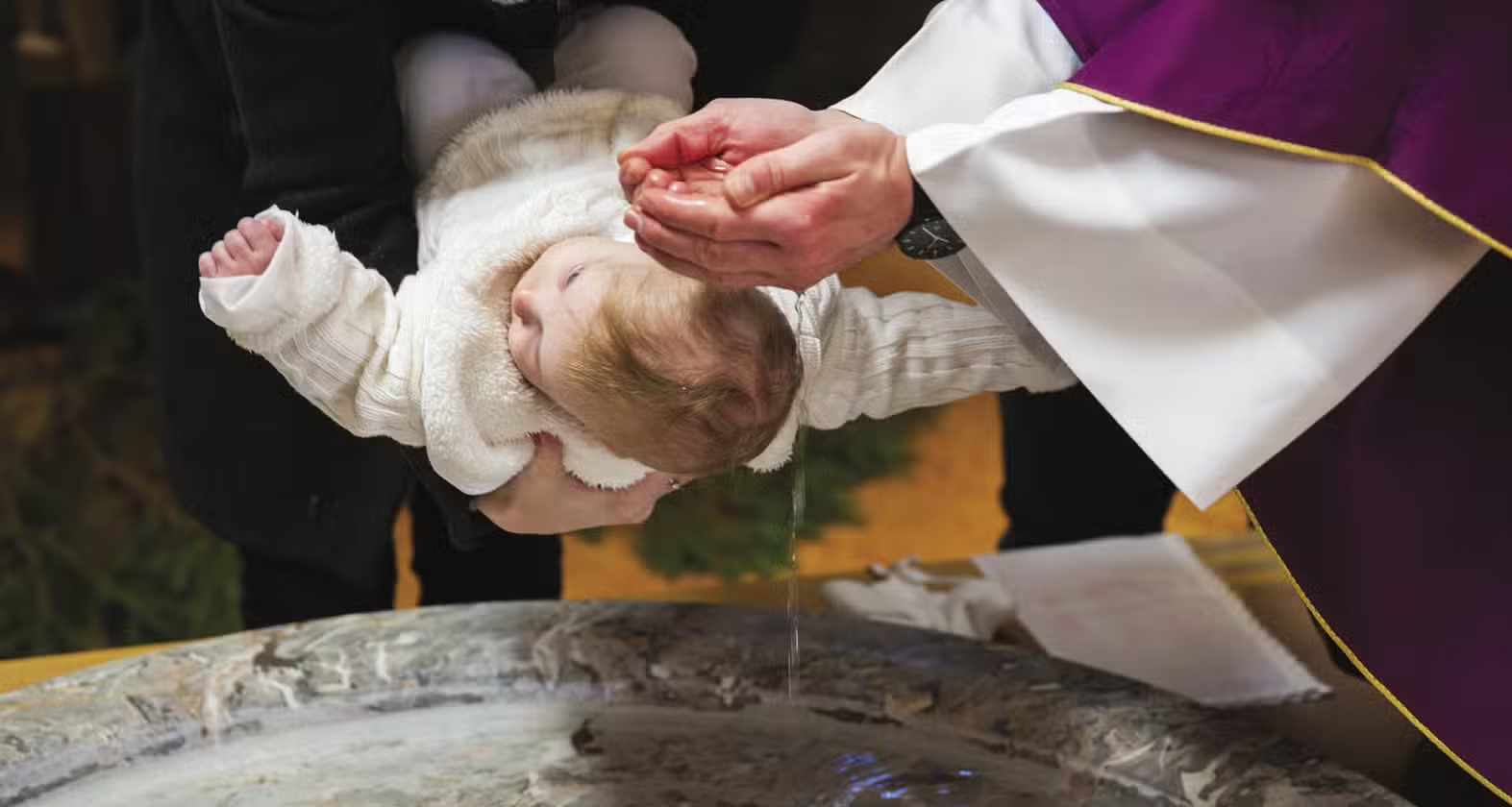My daughter and her boyfriend are not married but would like their newborn to be baptized in the Catholic Church. We are Roman Catholics and believe that our granddaughter should be baptized.
Yes, she can be baptized, but I suspect that any Catholic parish would schedule that only after your daughter and her boyfriend have made a permanent, public commitment to each other as husband and wife. Why are these two actions tied together?
One of the questions asked of parents at an infant’s Baptism is whether they intend to raise this child as a Catholic. A permanent commitment to each other is the best preparation for making a lifelong commitment to raising their daughter in the Catholic Church.
I appreciate that this may strike them as the Catholic Church setting up one more hoop—and an arbitrary one—for them to jump through, but it would not be prudent for the Church to baptize the child without a permanent commitment to each other on the part of the child’s parents.
I also appreciate that a quick Baptism now may relieve some family tension over this situation. The Church stands ready to help your daughter and her boyfriend become, as the Ritual for the Baptism of Infants says, your granddaughter’s “best teachers in the faith,” but they need to do their best to create a “domestic Church” at home.
I realize this is probably not the answer you were hoping I would give, but I think it is the most honest answer for all concerned and the one most likely to avoid future family tensions about raising your granddaughter as a Catholic.
If your daughter and her boyfriend decide not to marry, then whoever has custody of your granddaughter can explore having her baptized.
The child’s eternal salvation will not be placed in jeopardy if he or she is not baptized (Catechism of the Catholic Church, 1261).
Is Social Sin Real?
On a social media site that I often visit, someone recently posted that there is no such thing as social sin; there are only individual sins such as theft, murder, and adultery. According to the person who posted this, Jesus never condemned social sins such as racism, sexism, and similar actions.
This assertion would amaze Old Testament prophets such as Amos, Micah, and Isaiah, not to mention Jesus and all the New Testament writers. Social sin succeeds in flying “under the radar” as a prime example of something that is “no big deal” and for which no individual can ever be responsible. It represents naked, ruthless individualism taken to the extreme.
In denouncing religious rites unconcerned with personal conversion, Amos proclaimed, “Let justice surge like waters, and righteousness like an unfailing stream” (5:24). Some Israelites lie on ivory beds, “but are not made ill by the collapse of Joseph” (6:6).
Micah says: “You have been told, O mortal, what is good, and what the Lord requires of you: Only to do justice and to love goodness, and to walk humbly with your God” (6:8). Isaiah says that God rejects formalism in animal and cereal offerings. “Cease doing evil. Learn to do good. Make justice your aim: redress the wronged, hear the orphan’s plea, defend the widow” (1:16–17).
Jesus does not say that the deceased rich man was intentionally cruel to Lazarus; rather he failed to recognize Lazarus as a person loved by God (Lk 16:19–31). At the Last Judgment, Jesus condemns those who did not feed the hungry, clothe the naked, or perform other acts of compassion (Mt 25:31–46).
After the Catechism of the Catholic Church notes four ways in which an individual can cooperate in another person’s sins (1868), it states: “Sins give rise to social situations and institutions that are contrary to the divine goodness. ‘Structures of sin’ are the expression and effect of personal sins. They lead their victims to do evil in their turn. In an analogous sense, they constitute a ‘social sin’ [quoting St. John Paul II]” (1869).
The English philosopher Thomas Hobbes (d. 1679) spoke of “Nature red in tooth and claw” to describe life in its most basic terms. In more recent times, the writer Hannah Arendt (who died in 1975 and is admired by some US Catholic politicians) championed a ruthless individualism.
Every sin has social consequences, including the so-called “individual” sins cited in the question above: theft, murder, and adultery. Every sin tries but fails to redefine what is “normal.”
Quick Questions and Answers
I recently lost my wife after 50 years of marriage. I talk to her every day but am wondering if there are any Scripture passages about whether our beloved dead can hear us.
I cannot think of any Scripture passage that addresses this, but some passages praise the practice of praying for deceased loved ones (1 Thes 4:13–18). The bonds of love are not destroyed by death.
In our Bible study group (all Catholics) focusing on parables, someone recently asked if baptized Catholics who go to other churches can be saved. I said many people take various paths to the Lord. Someone else objected that ours is the one true Church. Was my response correct?
Yes. Deciding who can be saved is above my pay grade—and anyone else’s. Only God knows each person’s heart well enough regarding salvation, and that should be enough for all of us.
What exactly does filioque mean, and why wasn’t the term used in the First Council of Constantinople in AD 381?
Filioque is a Latin phrase meaning “and from the Son.” In the ninth century the West added it to the Nicene Creed (approved AD 325) to say that the Holy Spirit proceeds from God the Father and God the Son. Eastern Christians argued that such a change required the agreement of the entire Church.









1 thought on “Can This Child be Baptized?”
How do you despose of prayer cards. I receive tons in the mail. None are blessed. Do you have to burn them or can you just through them in the trash?